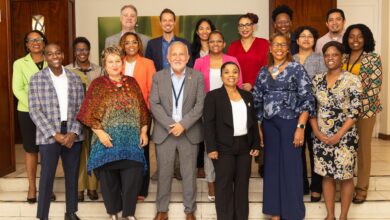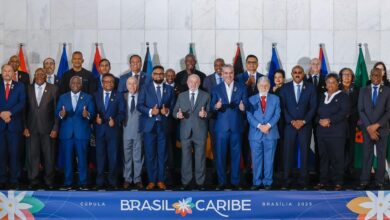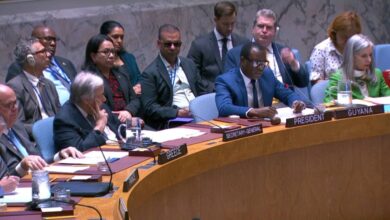(CARICOM Secretariat, Turkeyen, Greater Georgetown, Guyana) – The UWI Regional Headquarters (Hybrid), 20 March 2024, Session 1: Climate Change Mitigation Strategies: Opportunities for Africa and the Caribbean.
Salutations: Excellencies, Fellow Panelists, Distinguished Guests, Ladies and Gentlemen
I thank the Most Honourable P.J. Patterson, ON, OCC, OE, KC, Statesman in Residence, for this initiative which provides an excellent forum for the exchange of ideas and experiences on strengthening cooperation in the pursuit of development and prosperity of the Caribbean and Africa.
It is my pleasure to present along with the distinguished members of this panel, Professors Taylor and Akinola, on the matters of climate change mitigation strategies.
Climate change adaptation and mitigation is a standing agenda item at the highest level of the Caribbean Community (CARICOM) in the Meetings of the Conference of Heads of Government. Sustainable Development, including Environment and Disaster Management and Water, is a portfolio assignment in the CARICOM Quasi-Cabinet, with the Lead Head being the Honourable Prime Minister of Saint Lucia.
Governments of the Region have begun to take steps to reduce emissions and contribute to a global solution. You therefore see a blend of mitigation and adaptation strategies in the Nationally Determined Contributions of our Member States, indicating how they intend to reduce emissions over a five-year period. This is notwithstanding that, while the Caribbean as a whole contributes negligibly to the global emissions that accelerate climate change, we along with the rest of the developing world bear the brunt of the impact of climate change.
We engage in the cyclical process of negotiating, which for many of us is survival, in the context of the United Nations Framework Convention on Climate Change (UNFCCC) that should be leading to reduced global emissions. During these annual cyclical negotiations, we seek to ensure a circular flow of information from technical to ministerial officers, to Heads of Government, who then [provide] feedback with policy guidance and direction. This [approach] recognizes that matters of climate change mitigation and adaptation, access to funding to address the challenges we face, and the effectiveness of the commitments to the reduction of emissions by the Global North – which group of countries is responsible for the greatest proportion of the emissions that drive climate change – climate negotiations, in general, are at this stage determined primarily as matters of policy and diplomacy, not of science.
In this process of articulating policy and agreeing positions in the global negotiations that surround climate action, greater collaboration and coordination between Africa and the Caribbean can make a world of difference to both regions.
Despite the lethargy of global action, CARICOM is committed to climate resilience as a crucial developmental imperative. Our efforts will be advanced in May this year when Antigua and Barbuda will host the Fourth International Conference on Small Island and Low-lying Coastal Developing States (SIDS), from which the expected outcome is a new 10-year plan of action for SIDS that is agreed between SIDS and international partners. We are in a lengthy battle that will require the active engagement of our best minds and extensive participation, including from civil society and young people from the Caribbean, Africa, and beyond.
There is already a foundation of cooperation between Africa and CARICOM. At the First Africa-CARICOM Summit in 2021, both sides engaged on common challenges and opportunities and discussed critical global issues. These included the impacts of climate change, and the need for urgent global action and financing to support adaptation and mitigation investments in the developing world. The Leaders reaffirmed commitments “to pursue efforts to limit the temperature increase to 1.5 degree Celsius above pre-industrial levels as called for in the Paris Agreement”.
CARICOM and Africa already have a record of cooperation as demonstrated during the COVID-19 pandemic, when the Africa Medical Supplies Platform provided much-needed assistance to CARICOM countries to access vaccines. The opening of an Afreximbank office in Barbados to drive trade and investment between Africa and CARICOM, will hopefully lead to investments in renewables, climate-smart technologies and in other areas.
At the policy level, CARICOM has traditionally had a strong voice in the Alliance of Small Island States (AOSIS), which also counts African countries among its members. We look forward to coordinating with all our partners so that we can more effectively pursue efforts in the global space to address the existential threat that climate change poses to our Regions and our planet.
Two things that we can do better together- and I am limiting myself to just two at this time because there are many more: (i) pursuing a transition to renewable energy and energy efficiency; and (ii) leveraging natural assets – our forests and seas – to balance the global carbon footprint.
Like most developing and largely post-colonial countries, we in the Caribbean are faced with heavy dependence on costly imported oil, ageing power infrastructure, and vulnerable electrical grids. We are all vulnerable to fluctuations in both prices and supply within the global oil markets which exacerbate the Region’s energy insecurity and susceptibility to the impacts of climate change.
Renewable energy and energy efficiency are cornerstones for building resilience in our Region. We do this primarily to provide secure and sustainable supplies of energy and minimise energy waste across all sectors. We are implementing projects to transition to low-carbon and climate-resilient energy sources – whether solar, wind, hydro, geothermal, green hydrogen – in various CARICOM countries. The transformation of the energy sector is supported through the CARICOM Energy Policy and the Caribbean Sustainable Energy Roadmap and Strategy.
Estimates of what is needed to upgrade the Region’s power sector with modern, efficient, alternative energy options and increased generation capacity are north of US$11 billion. We need to add to that the investment necessary to modernize the power grids to reduce energy loss and increase disaster resilience. The reality is that much of the technology we need must be sourced from the global north and access to technology is difficult, even if we can meet the high cost.
Efforts to build energy security are also underway in Africa, and there is a great opportunity to share knowledge and work together to support advances in transition to renewables.
The second mitigation strategy is the great potential of leveraging nature to balance the carbon footprint by the removal of carbon from the atmosphere. CARICOM Heads of Government have placed renewed regional focus on advocacy to include forests, nature-based solutions, and blue carbon into market mechanisms.
New sources of finance for resilient development of the Region are possible through existing forest conservation programmes and carbon credit schemes. But there is a clear need for clarity of purpose, as well as transparent accounting and reporting systems. In particular, in the absence of effective commitment by all to transparency of process, we run the risk of being once again marginalised in an evolving system that could be helpful to developing states but could likely not be if we do not work more effectively together.
The potential for all developing states, to combine conservation goals, carbon sequestration and development financing through blue carbon and blue bond initiatives, in both private markets and bilateral arrangements, requires coordination and collaboration among all of us. There is much that can be done together if we sit together, work together, negotiate together and stand strong together.
The Caribbean has been at the forefront of increasingly frequent climate-related disasters. In the 2017 hurricane season, we had a record-breaking number of category five storms and hurricane names that have been retired because of the death and destruction they left in their path. We have strong Institutions, such as The University of the West Indies, the Caribbean Community Climate Change Centre, the Caribbean Disaster Emergency Management Agency and others, which coordinate scientific research, technical support and disaster response in our Region.
We – Africa and the Caribbean – are well within common strategic priorities for Caribbean institutions and African institutions to continue to build strong relationships to share knowledge and experience as we seek to stay alive, develop and prosper, even as the unfair and unequal impact of climate change advances upon us.
Excellencies, ladies and gentlemen, there is a lot of work that has begun, and there is much more that we need to do together in the mutual interest of the Caribbean and Africa.
Thank you.






